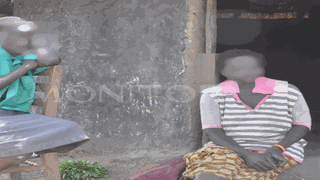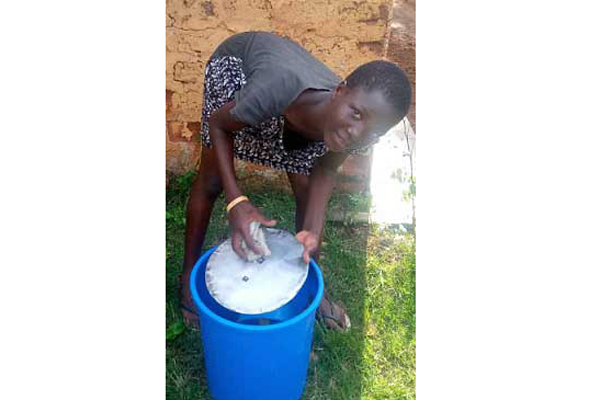
Special Reports
Prime
Shattered dreams: The pregnancy that weighed down P.6 pupil
What you need to know:
- When the country announced lockdowns in 2020 and 2021 to curb the spread of Covid-19, the most affected were school-going children, many of them staying home for close to two years.
- In this ninth installment of our continuing series, Shattered Dreams, we bring the story of a 19-year-old girl who dropped out of school because her parents weren’t in position to raise school fees. She is now pregnant, but hopes to return to school after giving birth.
Clara Acero, a former P6 pupil at St Jude Tadeo Owiny Primary School in Panyango Sub-county, Pakwach District, hopes that someday, she will resume formal education, as the last time she stepped into a class to study was when the first lockdown on education institutions was made in March 2020.
When the government declared the countrywide total lockdown as one of the measures to curtail the spread of the Covid-19 pandemic, public and private primary and secondary schools, as well as other education institutions were all ordered to close.
While in January, the government unlocked the country giving way for millions of learners to return to, Acero was one of those who did not.
Once the lockdown was imposed, her father Tom Omona was knocked out of his business.
Mr Omona, the only breadwinner in the family of 11 members, had kept the family surviving before the lockdown through repairing bicycles at his workshop in Pokwero Trading Centre, in Panyango Sub-county. On a good day, he would make approximately Shs10,000 once he repaired up to five bicycles. However, that has since changed.
“When my father was forced to stay home during the lockdown, things got so tough until now. My dad has never been able to revive the workshop from which he raised our school fees,” Acero said.
The 19-year-old is among several girls from her school who eventually dropped out as a result of the lockdown. The family has since resorted to surviving on subsistence farming, and Acero says her five other siblings have also been forced out of school.
“I am not sure that I may ever return to class again and continue my studies because I cannot tell when my parents may be in a position to raise these resources,” she said.
At St Jude Tadeo Owiny Primary School, a pupil is required to pay Shs49,000 in school fees, and an additional Shs11,000 for the foundation/PTA fees, totaling to Shs70,000 per term.
Currently though, school fees can hardly be a priority with the family struggling to meet the basic daily needs.
“Because we are so many and my dad and mum are struggling to make ends meet, at times they are forced to go with one meal a day,” she said.
Marriage attempts
Not having fees is, however, only one of Acero’s challenges. The long lockdown coupled with poverty complicated her situation even further, forcing her to elope with a 24-year-old barber at Pokwero Trading Centre, a year after she had stopped going to school in November 2021.
“The situation at home was so bad and I thought school would not open and so I decided to move into a relationship which lasted only a few months,” she recounted.
In December 2021, a month later, Acero abandoned the relationship and returned to her parents’ house with a pregnancy following what she said was an assault from her boyfriend and mistreatment by her in-laws.
She recalls how her parents were very upset once she eloped, to the point that they never wanted to hear or know anything relating to her stay with the boyfriend. “I really never wanted to get married at that age, but because schools were closed and the situation at home wasn’t any better, I thought I was making the right decision. I ended up hurting my parents and myself the most,” she said.
Beating Covid:It took me days to know I had Coronavirus
When the news about schools reopening in January spread, she initially received it with a lot of excitement like any other pupil eager to resume studies.
However, when her parents forced her to go for check-up at the clinic which revealed that she was pregnant, a feeling of worthlessness and hopelessness started to haunt her.
“I was eager to get back to class at all costs, including doing all sorts of petty or even dirty jobs to raise something for my fees but when I tested positive for pregnancy, I gave up,” she said.
Currently, her daily life is characterised by home chores among other duties.
“I leave the house very early in the morning to go for farm work, tend the animals, fetch water and firewood, and cook food for the family members and care for my parents. It is quite hectic in my condition, but I have to shoulder it,” she says, adding that even with the pregnancy, she cannot afford necessities such as medication, sanitary items such as soap, and food supplements.
She is, however, optimistic that her dream of becoming a lawyer will not be shattered.
My Covid story:All I needed was half a chance at survival, and I took it
She is also hopeful about returning to school once she gives birth, saying she is ready to face all the stigma and bullying that she may be subjected to once she resumes her studies as a teen mother.
“I will return to school and study the moment I deliver successfully; I know I might face bullying and teasing from fellow pupils who know my story, but that will not stop me because I have a dream.
“I feel the burden I have added onto my struggling parents even when I could not resume school but that does not mean I should give up,” she said.
Parents’ say
Mr Omona says he is determined to do all it takes to ensure Acero does not end up like her elder sisters who dropped out of school and married underage.
“I do not want Clara to end up like her other two sisters who dropped out of school and got married and after a short while, they returned home bringing for me and their mother more burdens.
“I say burden because each of them came back home with children. In order to make ends meet, I used to repair bicycles which business I used to make some small amount of money to support the family,” he added.
Mr Omona said although it was unfortunate that Acero returned pregnant, making her unable to resume her studies when schools opened in January, they are only waiting for her to deliver and return her to school while they take care of her baby, however, difficult it will be due to lack of resources.
“We are ready to let her get back to school after she delivers, however, challenging it will be since we are also supporting her other siblings, because she needs that bright future,” Mr Omona said.
My Covid-19 story: Self-isolation was one of the worst moments
He is concerned about the challenges she faces today and tries his best to help her. He says his daughter gets challenged by her schoolmates almost every day while they pass via his home to get to school, making her more interested in resuming class.
“There are days her schoolmates passed by dressed in school uniform. I realised that when she saw them, she would run back inside the house. I would follow her into the house only to find her crying seriously, it was then that I realised that she still wants to study.”
“I have asked her on several occasions about the school, and her response is always positive. She really wants to get back to school. So I together with her mother will take care of the baby while she is at school,” he added determinedly.
Research and remedy
In May, thispublication ran a story of a study done by John Paul II Justice and Peace Centre titled Covid-19 Pandemic: Bottleneck to the Education of the Teenage Girls in Uganda.
The study revealed that only 52 of 157 girls returned to school in 2022 at Oryang Primary School in Nebbi District, one of the 12 target schools.
While some pupils are optimistic about returning to school, others share a different sentiment because they feel they have outgrown the classes, fallen pregnant, or got married.
Mr Alfred Avuni, the director of John Paul II Justice and Peace Centre in Nsambya and one of the leaders of the research on the effects of Covid-19 on teenage girls, identified a few things to enable the affected girls go back to school.
1. The affected teenage girls need to be encouraged to go back to school. Both the government, religious and cultural leaders play a critical role in shaping the necessary narrative to influence the return of the affected teenagers to school.
2. The government should enroll more female teachers to be allocated in rural schools or hard to reach primary schools to help in address the issue affecting teenage girls in schools.
3. Some of the affected teenage girls may never return to school yet they are interested in life-skill training to enable them become self-reliant in managing their families. “The government can use the parish development model to establish vocational schools and skill-acquisition centres to facilitate pupils that no longer feel comfortable going to school,” Mr Avuni said.
According to Omara Djegeti Orech, a senior education officer in Lira District, the education journey and the prospects for better future will shatter if pupils do not return to school. “The only job opportunity in their docket will be casual labour. They will become poor mothers who cannot support their children and may as well end up abandoning their children,” Mr Orech said.
*Names have been changed to protect the persons’ identities.




